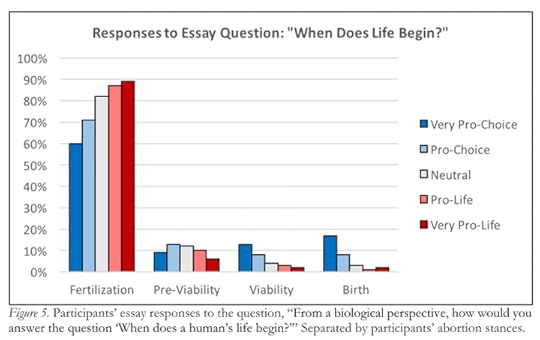Michael J. Behe's Blog, page 453
July 20, 2019
The Code 1202 glitch during the LM descent to the Moon
Why did the LM’s “mini” computer throw a restart glitch during the descent? Eyles — who wrote the code — tells the story:
We are here discussing the LM’s mini computer, which used IC’s to effect an unprecedented small size (and “only” 70 lbs, in a box Eyles describes as 1 ft x 2 ft x 6 inches):

Spoiler alert: a switch had been bumped, a radar overloaded the tiny 36,000 word memory and reset was triggered. Armstrong took over manual pilot and rode over a crater that was headlined at the time as an emergency leading to a blood pressure and heart rate surge.
A successful landing was effected (I recall, listening after church as my late Dad tuned on a short wave band) then that evening we listened in a darkened living room as the radio let us hear the first Moon Walk.
A moment of triumph that perhaps can help us rebalance and refocus towards progress. As I just noted in a post of the live stream:
Let us remember and let us learn. Hopefully, back to the Moon then onward to Mars, the Asteroid belt and solar system colonisation across this century — our real hope. And, a positive focus going forward.
Food for thought. END
Copyright © 2019 Uncommon Descent . This Feed is for personal non-commercial use only. If you are not reading this material in your news aggregator, the site you are looking at is guilty of copyright infringement UNLESS EXPLICIT PERMISSION OTHERWISE HAS BEEN GIVEN. Please contact legal@uncommondescent.com so we can take legal action immediately.
Plugin by Taragana
Would bypassing the Moon, going to Mars first, help with origin of life?
 Mars/NASA
Mars/NASARecently, US President Trump asked NASA, why not bypass the Moon and go to Mars first:
Trump made his interest in Mars much clearer today, asking Bridenstine to explain NASA’s Moon plans and why they were necessary. He asked Apollo 11 astronaut Michael Collins his thoughts, to which Collins replied, “Mars direct,” indicating NASA should go straight to Mars and bypass the Moon altogether. “It seems to me Mars direct,” Tump replied. “I mean, who knows better than these people. They’ve been doing this stuff for a long time. What about the concept of Mars direct?”
Loren Grush, “Trump repeatedly asks NASA administrator why we can’t go straight to Mars” at The Verge
It would provide a practical test of origin of life theories, long a victim of what-ifs, would-have-dones, and must-haves. If there apparently isn’t and never has been life on Mars, why should we assume it exists elsewhere? If there is/has been life on Mars and it looks like it came from Earth, well, that’s a game-changer in itself. If it doesn’t look like it came from Earth, that opens up whole new, non-speculative vistas.
The moon is a good place to test equipment.
The Mars Society offers some thoughts.
See also: Chemist James Tour calls time out on implausible origin of life theories He writes, “It is time for a temporary time out. Why not admit what we cannot yet explain: the mass transfer of starting materials to the molecules needed for life; the origin of life’s code; the combinatorial complexities present in any living system; and the precise non-regular assembly of cellular components?”
Follow UD News at Twitter!
Copyright © 2019 Uncommon Descent . This Feed is for personal non-commercial use only. If you are not reading this material in your news aggregator, the site you are looking at is guilty of copyright infringement UNLESS EXPLICIT PERMISSION OTHERWISE HAS BEEN GIVEN. Please contact legal@uncommondescent.com so we can take legal action immediately.
Plugin by Taragana
Apollo 11 Moon landing + 50 years today
A moment of triumph and a giant leap for mankind. Live stream:
Let us remember and let us learn. Hopefully, back to the Moon then onward to Mars, the Asteroid belt and solar system colonisation across this century — our real hope. And, a positive focus going forward. END
Copyright © 2019 Uncommon Descent . This Feed is for personal non-commercial use only. If you are not reading this material in your news aggregator, the site you are looking at is guilty of copyright infringement UNLESS EXPLICIT PERMISSION OTHERWISE HAS BEEN GIVEN. Please contact legal@uncommondescent.com so we can take legal action immediately.
Plugin by Taragana
July 19, 2019
Chemist James Tour calls time out on implausible origin of life theories

James Tour (CC0)
Origin of life is up there with why the space aliens haven’t landed and many people are getting tired of that.
It is time for a temporary time out. Why not admit what we cannot yet explain: the mass transfer of starting materials to the molecules needed for life; the origin of life’s code; the combinatorial complexities present in any living system; and the precise non-regular assembly of cellular components?
It would be helpful if leading researchers, among them very sophisticated synthetic chemists, were to step back, pause, and join forces. If the origins of life remain a mystery, two goals are within reach: an agreement about the rational standards by which OOL research should be judged, and a candid acknowledgment of the problems that remain to be overcome. A statement of this sort would be reassuring in its candor.
James Tour, “Time Out” at Inference Review
See also: The Science Fictions series at your fingertips – origin of life What we do and don’t know.
and
A world-famous chemist tells the truth: There’s No Scientist Alive Today Who Understands Macroevolution
Note:If you think you’ve heard of Inference Review, you might have heard of this story in passing:
Inference Review did NOT set out to make a fool of Adam Becker
Also: At Inference review: Language is so much more than a system of signals
Follow UD News at Twitter!
Copyright © 2019 Uncommon Descent . This Feed is for personal non-commercial use only. If you are not reading this material in your news aggregator, the site you are looking at is guilty of copyright infringement UNLESS EXPLICIT PERMISSION OTHERWISE HAS BEEN GIVEN. Please contact legal@uncommondescent.com so we can take legal action immediately.
Plugin by Taragana
Rob Sheldon on celeb physicists Sabine Hossenfelder, Ethan Siegel, and Chad Orzel
Recently, we looked at a conflict between theoretical physicists Chad Orzel and Sabine Hossenfelder on whether the crisis in particle physics is a moral imperative.
We were rather hoping our physics color commentator, experimental physicist Rob Sheldon, would weigh in—and here he is:
Chad Orzel is an establishment voice, just as Ethan Siegel “Starts with a Bang” is an establishment voice. That is why they are always defending the status quo, though neither of them can defend how we arrived at the status quo. That is, certain assumptions were made in 1950, 1970, 1990 and 2010 that led to particular subfields getting money while others were defunded. When the chosen fields did not produce results, as Sabine reminds us, we did not go back to try the other alternatives, instead, we gave more funds to add “new physics”: bells, whistles and above all adjustable dials to those barren theories. This is why we are stuck today, with billions invested in high-energy colliders and dark-matter detectors that have returned a fat zero for 30+ years.
Sabine says this is abnormal. Chad says it’s the new normal, get used to it. Ethan waffles between multiverse solutions and forbidding multiverse solutions, flitting from one wild metaphysic to another.
My own view is that we need to go back to 1950 and revisit the alternatives. Because solving today’s impasse doesn’t require any new physics, but old physics done differently.
![The Long Ascent: Genesis 1â 11 in Science & Myth, Volume 1 by [Sheldon, Robert]](https://i.gr-assets.com/images/S/compressed.photo.goodreads.com/hostedimages/1541285109i/26543752.jpg)
Rob Sheldon is the author of Genesis: The Long Ascent.
See also: Particle physics is a mess but Hossenfelder should chill, fellow physicist says Hmmm. He’s not giving fellow physicists much of an incentive to sort out the mess. On the other hand, civilized theoretical physicists fight so politely that you can learn a lot just by listening.
Follow UD News at Twitter!
Copyright © 2019 Uncommon Descent . This Feed is for personal non-commercial use only. If you are not reading this material in your news aggregator, the site you are looking at is guilty of copyright infringement UNLESS EXPLICIT PERMISSION OTHERWISE HAS BEEN GIVEN. Please contact legal@uncommondescent.com so we can take legal action immediately.
Plugin by Taragana
Robert J. Marks: Reforming peer review faces serious numerical law problems
 What’s hot? What’s not?/Niklas Bildhauer, Wikimedia
What’s hot? What’s not?/Niklas Bildhauer, WikimediaLaws concerning the way people behave around numbers mean that quantification itself invites certain types of corruption:
Goodhart’s Law, for example, captures the unintended effect of using numerical metrics as goals: “When a measure becomes a target, it ceases to be a good measure.”1
British economist Charles Goodhart’s law applies well beyond his specialty. As a general principle, focusing exclusively on a measurable numerical goal distracts from achieving the broader outcome that the metric is trying to track. Players focus on the numbers and try to game them, which often leads to deception and dishonesty. Crossing the finish line becomes more important than how you got there.
A consequence of Goodhart’s Law is the temptation to cheat to achieve a goal. This is called Campbell’s Law, after an American social scientist, Donald T. Campbell: “The more any quantitative social indicator is used for social decision-making, the more subject it will be to corruption pressures and the more apt it will be to distort and corrupt the social processes it is intended to monitor.”
In other words, measurement creates a temptation to achieve a measurable goal by less than totally honest means. As in physics, the simple act of measuring invariably disturbs what you are trying to measure.
As a professor at research universities for over forty years, I have observed that both Goodhart’s Law and Campbell’s Law have had a big impact in higher academia. Much of the impact has been negative.Robert J. Marks, “Why it is so hard to reform peer review” at Mind Matters News
It can be fought, he says, but there are no quick fixes.
Also by Robert J. Marks: Study shows that eating raisins causes plantar warts. Sure. Because, if you torture a Big Data enough, it will confess to anything
and
Things exist that are unknowable: A tutorial on Chaitin’s number
Follow UD News at Twitter!
Copyright © 2019 Uncommon Descent . This Feed is for personal non-commercial use only. If you are not reading this material in your news aggregator, the site you are looking at is guilty of copyright infringement UNLESS EXPLICIT PERMISSION OTHERWISE HAS BEEN GIVEN. Please contact legal@uncommondescent.com so we can take legal action immediately.
Plugin by Taragana
Steven Jacobs’ 5-year fight and when mammalian life begins
According to The College Fix:
UChicago scholar proves biologists believe life begins at conception. It took five years and cost him a career.
Daniel Payne – Assistant Editor •July 10, 2019
‘I’m doing this for the sake of the research’
Steven Jacobs has described some of his time in the academy as “agony.”
The University of Chicago PhD spent the last half-decade in a grueling fight to gather and publish research related to the American abortion debate. During that time he was ridiculed, mocked and defamed; accused of committing academic dishonesty, politicizing science and conducting his work with personal bias; compared to the Ku Klux Klan; and in general painted as an unprofessional radical who was, in one academic’s words, “not deserving of a PhD degree.”
All of this came about simply because Jacobs asked thousands of scientists several questions about when they believe human life begins – questions one respondent referred to as a “trap” and another called “horribly manipulative.”
The results of Jacobs’ work would eventually reveal a stunning fact about American academia in the field of biology: professors overwhelmingly agree with the pro-life position that human lives begin at conception. Gathering that data, arguing it, and getting it published, however, was a crushing and drawn-out affair.
This suggests, there may be yet another guilty secret lurking behind the dominant, widely promoted views. A clip of the results of his survey may give a clue:

Breitbart adds to our understanding of what seems to be a troubling case:
A study found 80 percent of Americans say biologists should decide the question of when life begins, and, when more than 5,500 biologists were then asked that question, 96 percent affirmed life begins at fertilization.
Steven Jacobs, Ph.D. completed his doctoral dissertation research (final publication pending, but an earlier version can be read here) recently at the University of Chicago, but only after a decade of investigation that ultimately led to his final study titled “Balancing Abortion Rights and Fetal Rights.”
In his research, Jacobs focused on studying Americans’ beliefs and values, attitudes toward abortion, and beliefs about when life begins.
One of the quotes he included in his study comes from an anonymous academic biologist, who said, “[The abortion debate] comes down to the question of whether we think personal autonomy is more important than the life of a human being.”
For the first part of his research, Jacobs went to the Supreme Court’s 1973 Roe v. Wade decision itself for a list of experts who might be considered most qualified to determine when life begins. He then presented this list to participants in one of his surveys.
Jacobs surveyed a sample of 3,883 Americans who were given the choice of biologists, religious leaders, voters, philosophers, or Supreme Court justices as the group of experts most qualified to determine when life begins.
According to the study, the sample was predominantly pro-choice (62 percent), liberal (63 percent), socialist (54 percent), and Democrat (66 percent.) Of the participants, 63 percent were college graduates, 57 percent were female, 43 percent were male.
Results showed 80 percent of Americans selected biologists (95 percent confidence interval [79-81 percent]) as the group to answer the question of when life begins.
Pro-choice participants (86 percent) were more likely to select biologists than pro-life participants (69 percent).
“I followed that up with an open-ended question: ‘Why did you select that group?” and 92 percent said they selected biologists because they are experts in science and they are objective scientists,” Jacobs told Breitbart News in an interview.
The researcher then took survey questions to 5,577 biologists from over a thousand academic institutions in 86 countries. According to the study, the sample of biologists was predominantly non-religious (63 percent), with more liberals (89 percent) than conservatives (11 percent), Democrats (92 percent) than Republicans (8 percent), and pro-choice supporters (85 percent) than pro-life supporters (15 percent).
While the study focused on the biological view of when a human’s life begins, the surveys also included questions about other scientific concepts related to genetics, etc. Participants were asked to respond “Correct” or Incorrect” to statements describing the biological view that “a human’s life begins at fertilization.” An open-ended question on the participants’ biological view of “when a human’s life begins” was also presented.
Overall, the study found 96 percent of biologists affirmed the view that a human’s life begins at fertilization (95 percent confidence interval [95-97 percent]).
The College Fix gives some troubling points of concern:
One respondent to Jacobs’ survey “accused me of nefarious intentions and threatened to sabotage my work by telling other biologists to not participate in my study,” the scholar said. That professor “ultimately reported me to my school’s ethics committee.” Jacobs’ advisor told him to halt his data-gathering, though eventually that advisor would defend Jacobs before the school’s ethics committee, after which the research was allowed to continue.
Further troubles
However, after beginning the survey again, this time in September 2016, “my study was once again canceled within a week.” Jacobs’ advisor was beleaguered with accusations that he himself “had no integrity for even approving [the] research.”
“I was told that my survey seemed like it was developed by the Ku Klux Klan; I was told that my work could expedite the extinction of the human race; I was told that I should be ashamed of myself since I was damaging the reputation of the University of Chicago,” Jacobs said.
He provided The Fix with a staggering number of responses from the survey respondents. Those emails range from the affirmative to the immaterial to the aggressively vituperative.
“A VERY poorly designed questionnaire. I doubt that ANY serious conclusions can be drawn from it,” one response reads. “Abortion has been legal for over 40 years. It’s time for all the religious nuts to get over it,” said another. “Abortion is a woman’s right; the state has no role in the decision to abort whatever the reason (medical, cultural, economic),” a third reads.
“Abortion is not about biology. Please don’t use this survey to say ‘Look, even biologists are pro-life’ because that is absolutely not what my answers mean,” another respondent said.
Others equivocated on the relevance of the questions. “Biology deals with facts. When a life, with value, begins or ends is best decided by philosophers and ethicists,” said a respondent.
Another wrote: “As a scientist, I agree that life begins at fertilization. But, as a citizen of this democracy, I support a woman’s right to choose. From that perspective, I adopt the opinion that life begins at first heartbeat.”
Another criticized Jacobs for referring to the two sides of the abortion debate as “choice” and “pro-life.” That professor requested that the terms be classified as “choice” and “anti-choice.”
This, in response to questions such as:
Asking biologists basic questions on human development
The survey questions were directed specifically at determining respondents’ beliefs about when individual lives begin. Respondents were asked to agree or disagree with two “implicit statements.”
The first read: “The end product of mammalian fertilization is a fertilized egg (‘zygote’), a new mammalian organism in the first stage of its species’ life cycle with its species’ genome.” The second declared: “The development of a mammal begins with fertilization, a process by which the spermatozoon from the male and the oocyte from the female unite to give rise to a new organism, the zygote.”
A subsequent “explicit statement” asked recipients to respond to this premise: “In developmental biology, fertilization marks the beginning of a human’s life since that process produces an organism with a human genome that has begun to develop in the first stage of the human life cycle.”
An open-ended essay question asked respondents to answer “from a biological perspective” the question “When does a human’s life begin?’”
The questions are firmly couched in the premises and presumptions of biological science rather than any political ideology. And yet the backlash to the survey was relentless and viciously negative.
Jacobs has apparently been told that he is in effect blacklisted; something that sounds all to familiar to those who have argued, analysed and done research that warrants a design inference.
This sort of pattern suggests a guilty secret.
Food for thought. END
Copyright © 2019 Uncommon Descent . This Feed is for personal non-commercial use only. If you are not reading this material in your news aggregator, the site you are looking at is guilty of copyright infringement UNLESS EXPLICIT PERMISSION OTHERWISE HAS BEEN GIVEN. Please contact legal@uncommondescent.com so we can take legal action immediately.
Plugin by Taragana
July 18, 2019
Particle physics is a mess but Hossenfelder should chill, fellow physicist says

Replying in a longstanding discussion with Sabine Hossenfelder, author of Lost in Math: How Beauty Leads Physics Astray, Chad Orzel, author of Breakfast with Einstein: The Exotic Physics of Everyday Objects, thinks she could be making too big a fuss about the current crisis in theoretical physics. Hossenfelder doubts the value of billion-dollar colliders, given the current mess.
Hossenfelder’s view regarding the beauty paradigm, as much as I find it congenial, is not by any means the consensus. There are plenty of eminent theorists out there who will argue with equal passion that current theoretical approaches are on the right track, and will eventually pay off. Those people tend to argue the opposite moral imperative— that other fields should bend their efforts toward new kinds of exotic physics searches.
To me, then, the current situation in theoretical physics isn’t clear enough to provide the kind of moral imperative Hossenfelder is arguing for. I agree that they have problems, and I am sympathetic to her view of the origin of those problems, but at the present moment the problems of particle theory are for particle theorists to sort out …
So, as I said above, it’s a classic agree-to-disagree situation. If I shared Hossenfelder’s belief that the problems of fundamental particle theory are the most important issue in physics, I would likely agree that these experiments should not be done. I don’t share that belief, though, so I find these kinds of experiments a perfectly reasonable avenue to pursue while we wait for particle theory to get its collective act together.
Chad Orzel, “The Crisis In Theoretical Particle Physics Is Not A Moral Imperative” at Forbes

Hmmm. He’s not giving them much of an incentive to sort out the mess. On the other hand, civilized theoretical physicists fight so politely that you can learn a lot by listening.
See also: Physicist Chad Orzel Takes Cosmos Remake Star Tyson To Task For Attack On Teachers
You Have To Know The Cosmos Remake Is In Trouble When … physicist Chad Orzel is saying stuff like this at ScienceBlogs
and
Science Blogger Chad Orzel Treads On Superman’s Cape
Follow UD News at Twitter!
Copyright © 2019 Uncommon Descent . This Feed is for personal non-commercial use only. If you are not reading this material in your news aggregator, the site you are looking at is guilty of copyright infringement UNLESS EXPLICIT PERMISSION OTHERWISE HAS BEEN GIVEN. Please contact legal@uncommondescent.com so we can take legal action immediately.
Plugin by Taragana
Do viruses play a hidden role in evolution?
Stories like this raise that question:
Viruses are justly feared as ingenious pathogens, causing diseases in everything they invade, including virtually all bacteria, fungi, plants and animals. Recent advances in the field of virology, however, suggest that viruses play a more significant and complex role than previously appreciated, and may be essential to the functioning of diverse ecosystems…
Intriguingly, a number of insect-transmitted plant viruses may have evolved mechanisms to influence vector behavior, making infected plants more attractive to sap-feeding insects or ensuring that infected plants produce chemicals that promote insect behaviors that help facilitate transmission.
In addition to their complex and varied chains of infection, some plant viruses have another unique property. Such viruses transmit their genomes in multiple packets, each containing only part of the virus’ complete genetic code, encapsulated in a separate virus particle. This peculiar strategy, which requires the co-transmission of several viral particles to a new host in order to ensure the integrity of the viral genome, is a feature believed to be unique to plant viruses. The nature and evolution of these so-called multipartite viruses remains a biological puzzle.
Plant viruses display considerable ingenuity in their strategies, which are highly dependent on their given environment. Some are generalists, invading multiple species, while other viruses are specialists that favour a narrow range of plant hosts. This selectivity may develop with time, through a process known as adaptive radiation. This typically occurs when a virus faces a heterogeneous habitat and becomes adaptively specialized to exploit particular ecological resources while becoming maladapted to exploit others. Such specialization acts to limit competition between different viral lineages or species. Alternatively, generalist viruses infect multiple plant hosts but must compete for these resources with other viruses. This situation tends to result in a viral population of low diversity dominated by the most acutely adapted viral genotypes.
Biodesign Institute, “Plant viruses may be reshaping our world” at Arizona State University
Viruses seem to be everywhere, doing a lot of things, with apparent “ingenuity.” Maybe a discovery down the road will be that they cause many changes currently interpreted according to some Darwinian theory (kin selection, costly fitness, what have you … )
Here’s the article (paywall). \
See also: Virus expert highlights the conflict over whether viruses are alive In short, it is an open question. The question relates to the role viruses can play in evolution, among other things. Are they precursors of life, detritus of life, or something in between? Or all three? Keep the file open.
Viruses invent their own genes? Then what is left of Darwinism?
Why viruses are not considered to be alive
Another stab at whether viruses are alive
Phil Sci journal: Special section on understanding viruses
Should NASA look for viruses in space? Actually, it’s not clear that RNA came first. Nor is it clear that viruses precede life. A good case can doubtless be made for viruses being part of the scrap heap of existing life. But no matter. If you think you can find viruses in space, boldly go.
Why “evolution” is changing? Consider viruses
The Scientist asks, Should giant viruses be the fourth domain of life? Eukaryotes, prokaryotes, archaea… and viruses?
and
Are viruses nature’s perfect machine? Or alive?
Follow UD News at Twitter!
Copyright © 2019 Uncommon Descent . This Feed is for personal non-commercial use only. If you are not reading this material in your news aggregator, the site you are looking at is guilty of copyright infringement UNLESS EXPLICIT PERMISSION OTHERWISE HAS BEEN GIVEN. Please contact legal@uncommondescent.com so we can take legal action immediately.
Plugin by Taragana
In case you wondered why so much science journalism sounds like PR
For a science establishment… Because it is, and some science boffins often want it that way:
FOR ERIN ZIMMERMAN, a plant molecular biologist turned freelance science writer living in Ontario, Canada, a recent plant science conference presented a rare opportunity to meet scientists working in the field and to gin up some story ideas. “It’s unusual for a conference in my niche to be within a day’s driving distance, so I was really excited to be going,” she said.
But she hit a roadblock. The conference organizer would only grant her a press pass if she allowed researchers she reported on, along with the conference committee, to review anything she wrote. Such an agreement would “run contrary to the editorial policy of most reputable outlets,” she emailed back, copying the department head and university press office. For reinforcement, she linked to a 2018 Nature article explaining norms for scientists’ interactions with the press.
It was to no avail. In a series of haranguing emails, the older scientist dismissed journalistic standards, slammed scientific publishers like Nature, and criticized Zimmerman’s own work — including a story written for Undark.
Teresa Carr, “Revisiting the Role of the Science Journalist” at Undark
Wow. That was some big bee that guy had in his bonnet. The article goes on to talk about the woes of science writing generally in an age of massive disruption.
Two thoughts: The biggest temptation for science journalists is to be cheerleaders instead of thoughtful and constructive critics. Everybody loves the cheerleader; the critic, however kindly and well-meaning, well — is just not loved so much. So one must be willing to be unpopular at times.
Also, a thoughtful science critic, like a thoughtful drama critic, must work from a point of view. And developing a point of view takes time, effort, research, and exposure. By definition, not everyone will agree with it. That’s what happens when you proceed from developed principles. But at least you have a basis for what you are saying that goes beyond “Well I like this!” or “Those people suck!” – O’Leary for News
Hat tip: Pos-darwinista
See also: Science Journalist Confronts Evolutionary Theorist With Hard Questions At His Book Talk (Suzan Mazur had some questions for David Sloan Wilson)
Science writer John Horgan still doubts cosmic inflation (Horgan has been more willing than many to make independent assessments)
and
Scientific American may be owned by Nature but it is run by Twitter This is the sad tale of a Science journalist who seems not to have guessed a complex unwritten rule.
Follow UD News at Twitter!
Copyright © 2019 Uncommon Descent . This Feed is for personal non-commercial use only. If you are not reading this material in your news aggregator, the site you are looking at is guilty of copyright infringement UNLESS EXPLICIT PERMISSION OTHERWISE HAS BEEN GIVEN. Please contact legal@uncommondescent.com so we can take legal action immediately.
Plugin by Taragana
Michael J. Behe's Blog
- Michael J. Behe's profile
- 219 followers



